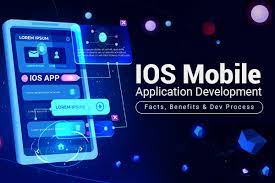Title: Exploring the Top Mobile App Development Software for Your Next Project
Introduction:
In today’s digital age, mobile applications have become an integral part of our lives. Whether it’s for business, entertainment, or productivity, a well-designed and user-friendly mobile app can make a significant impact. However, developing a mobile app from scratch can be a complex and time-consuming process. That’s where mobile app development software comes into play. In this article, we will explore some of the best mobile app development software available in the market.
Flutter:
Flutter is an open-source UI software development kit (SDK) developed by Google. It allows developers to build natively compiled applications for multiple platforms using a single codebase. With its fast rendering engine and hot-reload feature, Flutter enables developers to create visually appealing and high-performance apps for both Android and iOS platforms.
Xamarin:
Xamarin is a popular cross-platform development framework owned by Microsoft. It allows developers to write code in C# and build native apps for Android, iOS, and Windows platforms simultaneously. Xamarin offers excellent integration with Visual Studio IDE and provides access to platform-specific APIs, resulting in robust and feature-rich applications.
React Native:
React Native is another widely used open-source framework developed by Facebook. It uses JavaScript to build native-like applications for both Android and iOS platforms. React Native offers a vast collection of pre-built components that simplify the development process while providing excellent performance comparable to natively developed apps.
Appy Pie:
Appy Pie is a no-code/low-code mobile app development platform that empowers individuals or businesses with little or no coding experience to create their own apps effortlessly. With its intuitive drag-and-drop interface, Appy Pie allows users to customize their app’s design, add features like push notifications or social media integration, and publish it on various app stores without writing any code.
Adobe PhoneGap:
Adobe PhoneGap, formerly known as Apache Cordova, is an open-source mobile app development framework. It enables developers to build cross-platform applications using web technologies such as HTML, CSS, and JavaScript. PhoneGap provides access to native device functionalities through plugins, making it suitable for developing hybrid apps that can run on multiple platforms.
Conclusion:
Choosing the right mobile app development software is crucial for the success of your app project. The software mentioned above offers a range of features and capabilities that cater to different development needs. Whether you prefer a native-like experience or a simplified no-code approach, there’s a solution available for you. Consider your project requirements, budget, and skillset before making a decision. With the right mobile app development software by your side, you can bring your app idea to life and captivate users with an exceptional mobile experience.
6 Essential Tips for Choosing the Best Mobile App Development Software
- Research the available software to find the best fit for your project.
- Choose software that offers scalability and flexibility as mobile app development needs can change over time.
- Look for user-friendly features to make it easier for you to create a successful app.
- Make sure the software you choose is compatible with both iOS and Android platforms.
- Consider tools that offer cloud integration so you can easily access data from anywhere in the world.
- Look for support options such as tutorials, forums, and customer service teams when selecting your mobile app development software.
Research the available software to find the best fit for your project.
When embarking on a mobile app development project, one of the most crucial steps is to research and explore the available software options to find the best fit for your specific needs. The market is flooded with a plethora of mobile app development software, each offering unique features and capabilities. By taking the time to research and evaluate these options, you can ensure that you select the software that aligns perfectly with your project requirements.
Firstly, consider the type of app you want to develop. Are you targeting a specific platform like Android or iOS, or do you need cross-platform compatibility? This will help narrow down your choices as some software specialize in native app development for specific platforms while others excel at cross-platform development.
Next, assess your technical expertise and resources. Are you an experienced developer looking for a powerful coding environment, or are you a non-technical individual seeking a no-code/low-code solution? Understanding your skillset will guide you towards software that matches your proficiency level.
It’s also essential to review the features and capabilities offered by each software option. Look for tools that provide robust functionality such as UI design customization, integration with third-party APIs, database management, push notifications, and analytics. Consider whether the software supports rapid prototyping or offers collaborative features if you’re working in a team.
Furthermore, delve into user reviews and ratings to gain insights into the real-world experiences of developers who have used these tools. This feedback can provide valuable information about ease of use, performance, customer support, and overall satisfaction.
Finally, take cost into consideration. Evaluate pricing models – whether it’s a one-time purchase or subscription-based – along with any additional charges for add-ons or premium features. Ensure that the chosen software fits within your budget without compromising on quality or functionality.
By conducting thorough research on available mobile app development software options, you can make an informed decision that sets your project up for success. Remember that what works well for one project may not be the best fit for another, so take the time to assess your specific requirements and choose a software solution that aligns perfectly with your goals.
Choose software that offers scalability and flexibility as mobile app development needs can change over time.
When it comes to selecting the best mobile app development software, one crucial tip to keep in mind is to choose a platform that offers scalability and flexibility. Mobile app development needs can evolve and change over time, and having software that can adapt to these changes is essential for long-term success.
Scalability refers to the software’s ability to handle increased workloads, user demands, and data storage as your app grows. As your user base expands or new features are added, you’ll want a platform that can accommodate the increased traffic and data without compromising performance. Scalable software ensures that your app remains responsive and reliable even as it experiences growth.
Flexibility is equally important because mobile app requirements can shift as market trends change or user preferences evolve. You may need to incorporate new technologies, integrate with third-party services, or modify existing features. Choosing software that offers flexibility allows you to make these adjustments without starting from scratch or encountering significant roadblocks along the way.
By opting for scalable and flexible mobile app development software, you future-proof your application. It saves you from the hassle of migrating to a different platform when your needs outgrow the current one or when you require additional functionalities.
Additionally, scalability and flexibility contribute to cost-effectiveness in the long run. Instead of investing in multiple software solutions as your app evolves, choosing a platform that grows with you reduces unnecessary expenses and streamlines development efforts.
To ensure scalability and flexibility in mobile app development software, consider factors such as extensibility through APIs (Application Programming Interfaces), support for modular architectures, integration capabilities with other systems, and a track record of updates and improvements by the software provider.
In conclusion, when selecting the best mobile app development software for your project, prioritize platforms that offer scalability and flexibility. By doing so, you set yourself up for success in accommodating future growth while adapting to changing market demands. This approach not only saves time and resources but also ensures that your app remains competitive and relevant in the dynamic world of mobile applications.
Look for user-friendly features to make it easier for you to create a successful app.
When it comes to choosing the best mobile app development software, one crucial tip to keep in mind is to look for user-friendly features. Developing a successful app can be a complex process, and having software that simplifies the development journey can make a significant difference.
User-friendly features in mobile app development software can range from intuitive drag-and-drop interfaces to pre-built templates and components. These features allow developers, regardless of their coding expertise, to create apps with ease and efficiency. By eliminating the need for extensive coding knowledge, user-friendly software empowers individuals or businesses with limited technical skills to bring their app ideas to life.
The advantage of user-friendly features is that they streamline the development process and reduce the learning curve associated with traditional coding practices. With intuitive interfaces, developers can focus more on conceptualizing and fine-tuning their app’s design and functionality rather than getting lost in complex code structures.
Moreover, user-friendly software often provides visual previews or real-time simulations of how the app will look and behave on different devices. This allows developers to quickly iterate and make necessary adjustments before finalizing their app’s design.
By opting for mobile app development software with user-friendly features, you not only save time but also increase your chances of creating a successful app. The accessibility provided by these tools opens up opportunities for individuals or businesses who may not have extensive technical resources at their disposal.
In conclusion, when selecting mobile app development software, prioritize user-friendly features that simplify the creation process. By doing so, you’ll be able to focus on crafting an exceptional user experience and functionality while minimizing unnecessary complexities. Remember, creating a successful app should be an exciting journey rather than an overwhelming challenge – and user-friendly software can help you achieve just that.
Make sure the software you choose is compatible with both iOS and Android platforms.
When it comes to choosing the best mobile app development software, one crucial tip to keep in mind is ensuring compatibility with both iOS and Android platforms. In today’s mobile-driven world, catering to users on both major operating systems is essential for reaching a wider audience and maximizing your app’s potential success.
Developing separate apps for iOS and Android can be time-consuming, costly, and requires managing two different codebases. That’s why opting for software that supports cross-platform development is a smart choice. By using a single codebase that can be deployed on multiple platforms, you can save time and resources while ensuring consistent user experience across devices.
Cross-platform development frameworks like Flutter, Xamarin, and React Native offer the advantage of building apps that work seamlessly on both iOS and Android platforms. These frameworks provide tools and libraries that allow developers to write code once and deploy it across multiple platforms without compromising performance or user interface quality.
Additionally, choosing a mobile app development software that supports compatibility with both iOS and Android ensures easier maintenance in the long run. As updates or changes are required for your app, having a unified codebase simplifies the process of implementing these modifications across different platforms simultaneously.
Moreover, considering the market share of iOS and Android, targeting both platforms opens up significant opportunities for user acquisition. While iOS may have a larger presence in certain regions or demographics, Android dominates in terms of global market share. By making your app available on both platforms, you increase your chances of reaching a broader audience base.
In conclusion, when selecting mobile app development software, make sure it offers compatibility with both iOS and Android platforms. This will enable you to streamline the development process, ensure consistent user experience across devices, simplify maintenance tasks, and expand your reach to a wider user base. By following this tip, you set yourself up for success in the competitive world of mobile applications.
Consider tools that offer cloud integration so you can easily access data from anywhere in the world.
When it comes to choosing the best mobile app development software, one crucial tip to keep in mind is to consider tools that offer cloud integration. In today’s interconnected world, having the ability to access data from anywhere can greatly enhance the efficiency and convenience of app development.
Cloud integration allows developers to store and retrieve data securely on remote servers, eliminating the need for local storage or infrastructure. This means that even if you’re working remotely or collaborating with a team spread across different locations, you can easily access and share data seamlessly.
By opting for mobile app development software with cloud integration, you can enjoy several benefits. Firstly, it enables real-time collaboration among team members, allowing them to work on the same project simultaneously without any geographical constraints. This fosters efficient communication and improves overall productivity.
Furthermore, cloud integration ensures data security and reliability. With robust encryption protocols and regular backups, your valuable app data remains protected against potential loss or unauthorized access. Additionally, cloud services often have built-in disaster recovery mechanisms, providing an added layer of protection for your project.
Another advantage of cloud integration is scalability. As your app grows in popularity and user base increases, you may require more storage space or computing power. With cloud-based solutions, you can easily scale up your resources without investing in expensive hardware or infrastructure upgrades.
Moreover, accessing data from anywhere in the world eliminates the need for physical proximity to servers or local networks. Developers can work flexibly from different locations while maintaining seamless access to project files and databases. This not only enhances convenience but also allows for better work-life balance.
In conclusion, when selecting mobile app development software, considering tools that offer cloud integration is a wise decision. The ability to access data from anywhere in the world brings numerous advantages such as improved collaboration, enhanced security, scalability options, and increased flexibility. By harnessing the power of cloud technology in your development process, you can streamline workflows and create exceptional mobile applications efficiently.
Look for support options such as tutorials, forums, and customer service teams when selecting your mobile app development software.
When it comes to selecting the best mobile app development software, there are several factors to consider. One important aspect that often gets overlooked is the availability of support options. Having access to tutorials, forums, and customer service teams can greatly enhance your development experience and ensure that you receive the assistance you need throughout the process.
Tutorials are a valuable resource for developers, especially those who are new to a particular software or programming language. They provide step-by-step guidance on how to use different features, navigate the software, and troubleshoot common issues. Tutorials can help you get up to speed quickly and make the most out of your chosen mobile app development software.
Forums are another excellent support option to look for when selecting your app development software. They serve as a community hub where developers can ask questions, share knowledge, and seek advice from experienced individuals. Participating in forums allows you to tap into a vast pool of expertise and learn from others’ experiences. It’s also a great way to stay updated on the latest trends and best practices in mobile app development.
In addition to tutorials and forums, having access to a responsive customer service team is crucial. When faced with technical challenges or specific queries about the software, being able to reach out for assistance can save you time and frustration. A reliable customer service team should be prompt in addressing your concerns and providing solutions tailored to your needs.
By considering support options such as tutorials, forums, and customer service teams during your selection process, you ensure that you have resources readily available when you encounter obstacles or have questions while developing your mobile app. These support channels not only help you overcome challenges but also foster continuous learning and improvement in your development skills.
Remember that developing a mobile app is not just about choosing the right software; it’s also about having access to comprehensive support options that empower you throughout your journey. So, prioritize these support features when making your decision and set yourself up for success in creating a remarkable mobile app.




